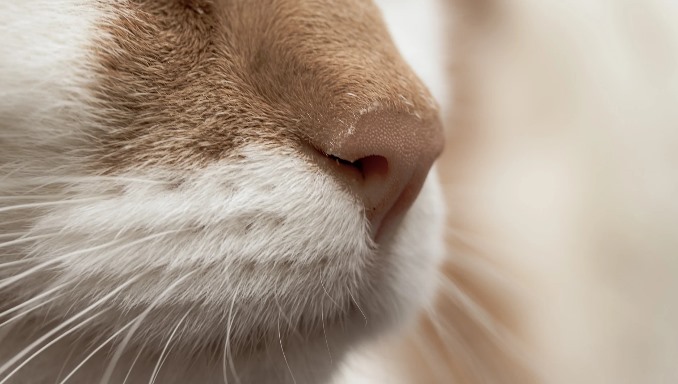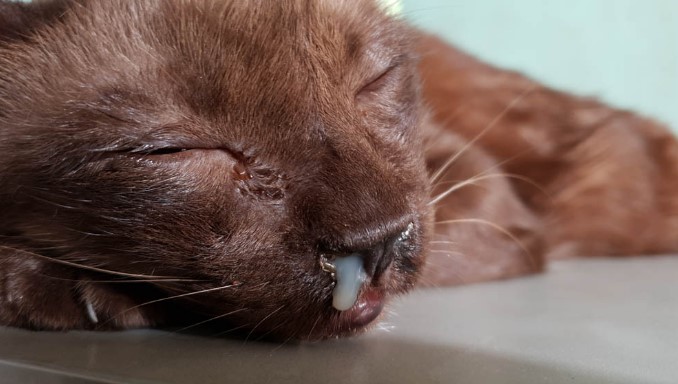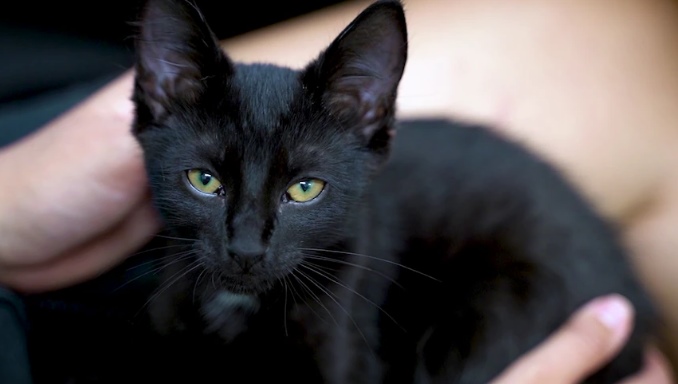Why Is My Cat’s Nose Wet?
Do you know Why is my cat’s nose wet? Although the function of a cat’s nose is not completely understood, it is clear that their wet noses play an important role in their daily lives. By understanding why cats have wet noses and what they use them for, we can better care for our feline companions and help them live healthy, happy lives. Have you ever wondered why your cat’s nose is always wet? Well, wonder no more! In this post, we will explore the various reasons behind this odd phenomenon and discuss how it helps cats live their everyday lives. Stay tuned to learn more about your kitty’s soggy snout!
Why Is My Cat’s Nose Wet?
Why is a cat’s nose wet? A wet cat’s nose depends on many environmental, health, and physical factors. Wet noses can be very beneficial for cats in a variety of ways. Let’s find out in detail what causes cats to have cold and wet noses.
Environment
The humidity of a cat’s nose is affected by the temperature and humidity in the air around it. Wet weather leads to condensation of water particles in the air the cat exhales, leaving the outside of the cat’s nose wet.
Lick
Since a cat’s nose is within reach of their tongue, any licking action can spread moisture to the cat’s nose. When cats wash their faces, they often lick their hands, then wipe their noses and wipe their faces.
Drink water
Most cats are clean guys and they do a great job of keeping their faces clean and dry during the drinking process. However, if the water level in their bowl is too low, they may accidentally poke their nose too deep when trying to drink. This leaves the cat’s nose wet, but this only lasts for a short time.
Due to tears
When your cat has tears in her eyes or produces too many tears, for example, her eyes are itchy. Tears will flow down making the cat’s nose wet.
Also, the cat’s nose is wet when the cat purrs. Basically, this happens because there is no hair on the skin on the cat’s nose. The sweat glands are active when the cat makes this purr sound. Because there is no hair to cover, the cat’s nose is wet. This phenomenon is completely natural and absolutely nothing to worry about.

Wet Cat Nose and the Effects It Brings
Regulates Body Temperature: In the summer, a wet cat’s nose is especially helpful in lowering a cat’s body temperature. The whole body can’t do that because the cat’s body is covered with hair, but the nose is not. Excess water is evaporated from the skin of the nose. Thus, lowering body temperature.
Better sense of smell: It sounds a bit weird, but it’s true in the case of cats. You’re probably used to cats licking their noses. This is because cats instinctively lick their noses. When the cat’s nose is wet, the scent particles will stick to it and help the cat recognize them the next time a similar smell appears.
It is completely natural to have a wet cat’s nose, it helps cats in many ways. However, a cat’s nose that’s too wet can be a sign of some illness the cat may have. In this case, you should bring the cat to the veterinarian for proper advice.
Why is A Cat’s Nose Dry or Warm?
Is the cat’s nose dry? A dry cat’s nose is just as common as a wet cat’s nose and is usually no particular cause for alarm.
It’s normal for cats to have just woken up and have a dry nose. This is simply because cats don’t lick their noses during sleep. In addition, the cat’s nose is dry or warm if the cat is in the sun, near a heat source, or next to a fan or vent.
Cold or dry air can draw moisture from the nose, causing the cat’s nose to dry out and even crack the cat’s nose. This is especially true during the winter months.
If your cat’s nose skin is too dry or cracked, it could be due to dehydration. This is due to reduced water intake or excessive dehydration. If your cat’s nose is dry for 2 days straight and drinking less water than usual, take her to the vet immediately. It could be a sign of an underlying disease.
Health Problems that Cats Can Have if Their Noses Are Too Wet or Dry
An excessively wet nose can be due to respiratory problems, allergies, or a runny nose. If your cat’s nose is constantly running and she can’t seem to stop it, take her to the vet immediately. Excessive tearing can also cause a cat’s nose to be too wet.
If the cat’s nose is too dry, it could be due to dehydration, a cold, or a sinus infection. A cat’s nose should never be too dry to the point where it cracks and bleeds. If this happens, take her to the vet right away.
Cats with health problems usually have other symptoms in addition to having a wet or dry nose. If your cat’s nose is wet or dry and she has other symptoms, such as lethargy, appetite loss, fever, or difficulty breathing, take her to the vet immediately.
Wet or dry, a cat’s nose is an important part of her health. Be sure to keep an eye on it and take her to the vet if you notice any changes.

Health Problems with Cat Nose
While a runny nose is generally nothing to worry about in cats, there are a few health problems that can cause a cat to have discharge from their nose. If your cat has a runny nose and is also showing other signs of illness, such as sneezing, coughing, or fever, then they may have an upper respiratory infection. This is a common illness in cats, and is usually caused by a virus or bacteria. Treatment typically involves antibiotics and supportive care, such as fluids and rest.
If your cat’s nose discharge is greenish or yellowish in color, this could be a sign of a sinus infection. This type of infection is usually caused by bacteria, and will require treatment with antibiotics. In some cases, surgery may be necessary to clear out the infected sinuses.
A runny nose can also be a symptom of allergies in cats. Allergic reactions can be triggered by things like pollen, dust, or certain foods. If your cat is allergic to something, they may experience symptoms like sneezing, watery eyes, and a runny nose. Treatment for allergies typically involves avoiding the trigger substance and providing symptomatic relief with antihistamines or other medications.
If your cat has a runny nose that does not improve with treatment, or if they develop other symptoms like difficulty breathing, seizures, or collapse, then they may have a more serious condition and should be seen by a veterinarian immediately.
Summary, A cat’s nose can show a variety of diseases, including respiratory infections, allergies, and even cancer. If you notice any changes in your cat’s nose, it is important to take them to the veterinarian for an evaluation. Respiratory infections are common in cats and can cause a variety of symptoms, including a runny nose, sneezing, and fever. Allergies can also cause a runny nose and sneezing, as well as itchiness and redness. Cancer of the nose is relatively rare in cats, but can cause ulcers, bleeding, and weight loss. If you notice any changes in your cat’s nose, it is important to have them evaluated by a veterinarian.
How to Keep Your Cat’s Nose Healthy
Your cat’s nose is one of the most important features on their face. Not only is it used for smell, but it also helps them keep balance and aids in keeping their face warm. Therefore, it’s important to do everything you can to keep your cat’s nose healthy.
Here are a few tips for keeping your cat’s nose healthy:
1. Keep the area clean. Just like you would clean a wound on your own skin, it’s important to keep your cat’s nose clean if they have any cuts or scrapes. Use a warm, damp cloth to wipe away any dirt or debris. If the area is particularly dirty, you can also use a cotton swab dipped in warm water.
2. Check for any signs of infection. If you notice that your cat’s nose is red, swollen, or oozing any kind of discharge, they may have an infection. Take them to the vet as soon as possible so that they can be treated.
3. Keep their nails trimmed. If your cat has long nails, they may scratch their nose often. This can lead to irritation and infection. Keep their nails trimmed to prevent this from happening.
4. Don’t use harsh chemicals. If you need to clean your cat’s nose for any reason, avoid using harsh chemicals. These can be irritating and even dangerous for your cat. Stick to using warm water and a mild soap.
5. Pay attention to changes. If you notice any changes in your cat’s nose, such as discoloration, swelling, or discharge, take them to the vet right away. These could be signs of a serious problem.
By following these tips, you can help keep your cat’s nose healthy and avoid any problems.
The Incredible Abilities of A Cat’s Sense of Smell
While a cat’s sense of smell is not as acute as a dog’s, it is still quite impressive. Cats have approximately 200 million olfactory receptors in their noses, while humans have only about 5 million. This means that a cat’s sense of smell is about 40 times more sensitive than ours.
Cats use their sense of smell for many different purposes. They use it to find food, to identify other cats, and even to keep track of their own belongings. Cats also rely on their sense of smell to help them avoid predators and danger.
Interestingly, a cat’s sense of smell can also be used for communication. When a cat rubs its head against you or your belongings, it is actually leaving behind its own unique scent. This scent helps the cat to claim you as its own and makes you more recognizable to them.
So, while a cat’s sense of smell may not be as strong as a dog’s, it is still an incredibly important part of their lives. Without it, they would be lost.
A cat’s sense of smell is so strong that it can easily tell if its owner is touching another cat and petting them. With 200 million scent receptors in their nasal cavity, cats have the ability to sniff out prey, find their way home, and identify other animals in their lives. They can tell where you’ve been throughout the day with a quick sniff. Imagine your wife is a cat, I can’t imagine what will happen!

FAQs
Are cats supposed to have a wet nose?
The answer to this question depends on the cat. Some cats may have a naturally wet nose, while others may have a dry nose. However, if your cat’s nose is suddenly dry and cracked, it could be a sign of a problem and you should take them to the vet.
How often should I clean my cat’s nose?
You should clean your cat’s nose as often as necessary. If they have any cuts or scrapes, be sure to clean the area with a warm, damp cloth. You should also check their nose for any signs of infection and take them to the vet if you notice anything out of the ordinary.
Can I use a Q-tip to clean my cat’s nose?
You should avoid using a Q-tip to clean your cat’s nose. Q-tips can be irritating and even dangerous for your cat. Stick to using a warm, damp cloth or a cotton swab dipped in warm water.
Does a wet nose on a cat mean they are healthy?
A wet nose on a cat does not necessarily mean they are healthy. Some cats may have a naturally wet nose, while others may have a dry nose. However, if your cat’s nose is suddenly dry and cracked, it could be a sign of a problem and you should take them to the vet.
Does a wet nose mean a cat is hydrated?
There is no easy answer to this question since it can depend on the individual cat. Some cats may have wet noses due to licking them frequently, while others may have naturally moist noses. If you are concerned about your cat’s hydration levels, it is best to consult with a veterinarian. They will be able to determine if your cat is adequately hydrated and make recommendations accordingly.
How can you tell if cat has a fever?
There are a few ways to tell if your cat has a fever. One way is to feel their nose. If it is warm and dry, it could be a sign of a fever. You can also check their gums. If they are pale or bright red, it could be another sign of a fever. If you are concerned that your cat might have a fever, it is best to take them to the vet for an evaluation.
How do you tell if a cat has a cold?
There are a few ways to tell if your cat has a cold. One way is to listen to their breathing. If they are wheezing or having trouble breathing, it could be a sign of a cold. You can also check their nose. If it is runny or congested, it could be another sign of a cold. If you are concerned that your cat might have a cold, it is best to take them to the vet for an evaluation.
What are some home remedies for a cold in cats?
There are a few home remedies that you can try if your cat has a cold. One is to make sure they are drinking plenty of fluids. You can also try clearing their nose with a warm, damp cloth. If your cat is having trouble breathing, you can try using a humidifier in their room. If you are concerned about your cat’s cold, it is best to consult with a veterinarian. They will be able to recommend the best course of treatment for your cat.
How wet should a cat’s nose be?
There is no definitive answer to this question since it can depend on the individual cat. Some cats may have naturally wet noses, while others may have dry noses. A cat’s nose should be slightly wet. If it is dry, this could indicate that the cat is dehydrated. If the nose is excessively wet, this could mean that the cat is sick or has an infection. If you are concerned about your cat’s nose, it is best to consult with a veterinarian. They will be able to determine if there is anything abnormal about your cat’s nose and make recommendations accordingly.
Is a cat’s nose unique?
Yes, a cat’s nose is unique. A cat’s nose has ridges on the surface that are similar to fingerprints in humans: no two cats have the exact same pattern of ridges and whorls. These unique patterns help cats identify other individual cats by smell.
While cats can’t recognize each other through their vision, they can recognize each other through their sense of smell. Their noses also have specialized scent receptors that are incredibly sensitive and help cats pick up on even the slightest scents. A cat’s nose is not just a cute feature – it is an important tool for communication, tracking, and protection.
Conclusion
Although the reason for a cat’s wet nose is still unknown, it is speculated that it has something to do with their sense of smell. Cats use their noses to detect chemicals in the air, and the moisture on their noses helps them pick up these scents more easily. In addition, a wet nose helps keep cats cool by radiating heat away from their body. So although we may never know definitively why cats’ noses are wet, we can rest assured that there are good reasons behind this seemingly odd behavior!
Above is the article “Why is my cat’s nose wet?”, Thanks for reading!








